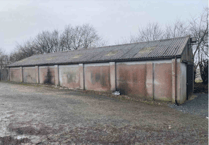TORRIDGE and West Devon MP, Geoffrey Cox, marked the official switch-on of three renewable energy technologies at a community centre in Merton, near Okehampton, on World Environment Day on Friday.
Clinton Hall has 22 new solar panels on the roof to generate electricity and four new solar thermal panels to provide hot water. Geothermal energy will also power a new ground source heat pump, using heat trapped below ground, for under floor heating.
The pump works by pumping cold liquid through 12 fluid filled boreholes 40 metres below ground. The liquid is warmed by solar energy stored in the earth and flows up to the surface where a compressor raises the temperature to a level that can be used for heating the building. The system should meet two thirds of the building's annual heating needs, with the existing boiler system supporting the heat pump when required.
Together the three renewable energy projects are expected to save nearly ten tonnes of carbon dioxide every year. A display panel inside the hall has live data showing how much energy is being generated on site.
The £85,283 cost of the renewable energy project was met by £37,847 from the government's Low Carbon Buildings Programme, £28,385 from EDF Energy's Green Fund, £10,470 from Renewable Energy 4 Devon and £9,060 from the hall's funds.
Mr Cox said: "I am delighted to launch this excellent project. Community schemes like these are an excellent way of raising awareness of micro-generation. The green benefits are obvious, but in these times of high energy bills installing these devices is an excellent way of saving a lot of money."
Tim Horner, from Clinton Hall Management Committee, which led the project, said: "We are one of the first community halls in Devon to have a combination of these three renewable energy technologies. It feels brilliant to have completed this project. Apart from the environmental benefits, we are hoping we can reduce our overall costs, which is vital for the future viability of the hall. We already use low energy light bulbs and the hall is well insulated but we wanted to make it a green hall. We hope this project will inspire people to make the energy savings which everyone is capable of achieving."
The hall provides essential facilities for social activities, meetings and a pre-school. It also acts as a sports hall for Clinton Primary School and is booked for private events.
EDF Energy has awarded £3.7million to 221 renewable energy projects since the Green Fund was launched in 2001, including £1.3million to 89 projects in schools, nurseries and colleges. The fund supports renewable energy projects which produce power from the sun, wind, water and geothermal sources that reduce greenhouse gases linked to global warming.
Awards of up to £30,000 are available for projects in Great Britain and such funds have helped schools, charities, local authorities, churches, water mills and other non-profit organisations to generate clean, green energy in their own community.





Comments
This article has no comments yet. Be the first to leave a comment.